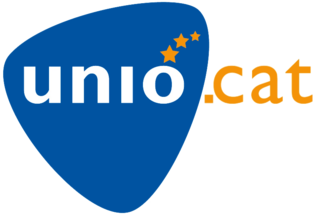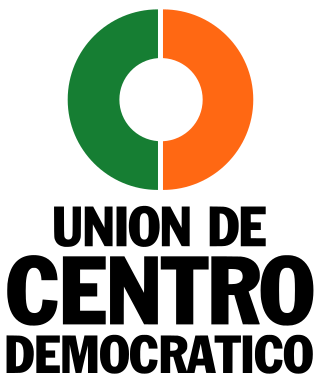
The Democratic Union of Catalonia, frequently shortened as Union, was a regionalist, Christian-democratic political party in the Catalonia region of Spain existing between 1931 and 2017. Together with Democratic Convergence of Catalonia (CDC), they formed the Convergence and Union (CiU) alliance and federation from 1978 until its dissolution in 2015, under which they would rule the government of Catalonia for almost three decades during the recent Spanish democratic period.

The Union of the Democratic Centre was an electoral alliance, and later political party, in Spain, existing from 1977 to 1983. It was initially led by Adolfo Suárez.

The 1983 Aragonese regional election was held on Sunday, 8 May 1983, to elect the 1st Cortes of the autonomous community of Aragon. All 66 seats in the Cortes were up for election. The election was held simultaneously with regional elections in twelve other autonomous communities and local elections all throughout Spain.

The 1982 Andalusian regional election was held on Sunday, 23 May 1982, to elect the 1st Parliament of the autonomous community of Andalusia. All 109 seats in the Parliament were up for election.

The 1981 Galician regional election was held on Tuesday, 20 October 1981, to elect the 1st Parliament of the autonomous community of Galicia. All 71 seats in the Parliament were up for election. The election was held simultaneously with a Statute of Autonomy referendum in Andalusia.

The 1983 Asturian regional election was held on Sunday, 8 May 1983, to elect the 1st General Junta of the Principality of Asturias. All 45 seats in the General Junta were up for election. The election was held simultaneously with regional elections in twelve other autonomous communities and local elections all throughout Spain.

The 1983 Cantabrian regional election was held on Sunday, 8 May 1983, to elect the 1st Regional Assembly of the autonomous community of Cantabria. All 35 seats in the Regional Assembly were up for election. The election was held simultaneously with regional elections in twelve other autonomous communities and local elections all throughout Spain.

The 1983 Murcian regional election was held on Sunday, 8 May 1983, to elect the 1st Regional Assembly of the autonomous community of the Region of Murcia. All 43 seats in the Regional Assembly were up for election. The election was held simultaneously with regional elections in twelve other autonomous communities and local elections all throughout Spain.

The 1983 Castilian-Leonese regional election was held on Sunday, 8 May 1983, to elect the 1st Cortes of the autonomous community of Castile and León. All 84 seats in the Cortes were up for election. The election was held simultaneously with regional elections in twelve other autonomous communities and local elections all throughout Spain.

The Christian Democratic Party was a Spanish Christian democratic political party, founded in 1977. The leaders of the PDC were Fernando Álvarez de Miranda and Íñigo Cavero.

People's Party was a Spanish liberal conservative political party, founded in 1976. The leaders of the PP were Pío Cabanillas Gallas and José María de Areilza.

The 1983 Balearic regional election was held on Sunday, 8 May 1983, to elect the 1st Parliament of the autonomous community of the Balearic Islands. All 54 seats in the Parliament were up for election. The election was held simultaneously with regional elections in twelve other autonomous communities and local elections all throughout Spain.

The 1980 Catalan regional election was held on Thursday, 20 March 1980, to elect the 1st Parliament of the autonomous community of Catalonia. All 135 seats in the Parliament were up for election. This was the first regional election to be held in Catalonia since the Spanish transition to democracy and the second democratic regional election in Catalan history after that of 1932.

Union of the Centre of Catalonia was a political party based in Catalonia, created in March 1978 as a result of the merger of Catalan Centre, League of Catalonia–Catalan Liberal Party, Union of the Christian Democrats of Catalonia–Jacques Maritain Club, most of the Social Democratic Party of Catalonia and Party of the Catalan People. The party was led by Carles Güell as president and Joaquim Molins as secretary-general.
The People's Democratic Party was a Spanish political party of liberal centre, integrated in the Union of the Democratic Centre (UCD). Its president was Fernando Chueca, and his Secretary General was Ignacio Camuñas.
A referendum on the initiative of the Andalusian autonomy process was held in Andalusia on Thursday, 28 February 1980. Voters were asked whether they ratified a proposed initiative for the provinces of Almería, Cádiz, Córdoba, Granada, Huelva, Jaén, Málaga and Seville to organize themselves into an autonomous community of Spain throughout the legal procedure outlined in Article 151 of the Spanish Constitution of 1978.
A referendum on the approval of the Andalusian Statute of Autonomy was held in Andalusia on Tuesday, 20 October 1981. Voters were asked whether they ratified a proposed Statute of Autonomy of Andalusia bill organizing the provinces of Almería, Cádiz, Córdoba, Granada, Huelva, Jaén, Málaga and Seville into an autonomous community of Spain. The final draft of the bill had been approved by the Andalusian Assembly of Parliamentarians on 1 March 1981, but it required ratification through a binding referendum and its subsequent approval by the Spanish Cortes Generales, as established under Article 151 of the Spanish Constitution of 1978. The referendum was held simultaneously with a regional election in Galicia.

Andalusian Unity was a political party launched in December 1980 by former minister Manuel Clavero as a split from the Union of the Democratic Centre (UCD) over disagreement with UCD's autonomic policy on the 1980 Andalusian autonomy initiative referendum. The party was officially registered on 22 January 1981. Clavero was the party's president, whereas Manuel Otero Luna was elected as secretary general.
The Extremaduran Regional Action was a Spanish political party founded on 7 November 1976 as the first regionalist party in Extremadura. Enrique Sánchez de León was the party's secretary-general from 26 March 1977. AREX joined the Union of the Democratic Centre (UCD) electoral alliance ahead of the 1977 Spanish general election, gaining 4 seats in the Congress of Deputies. The party would be eventually merged into the UCD upon the party's constitution as a unitary party.

Manuel Francisco Clavero Arévalo was a Spanish lawyer and politician who as Assistant Minister of the Regions between July 1977 and April 1979 contributed to the construction of the current State of Autonomies in Spain. He also served as Minister of Culture from April 1979 to January 1980.













